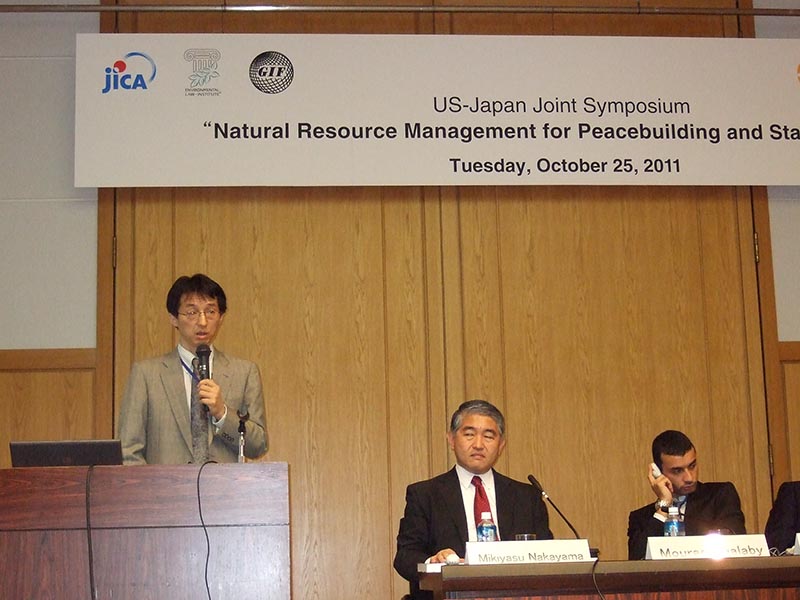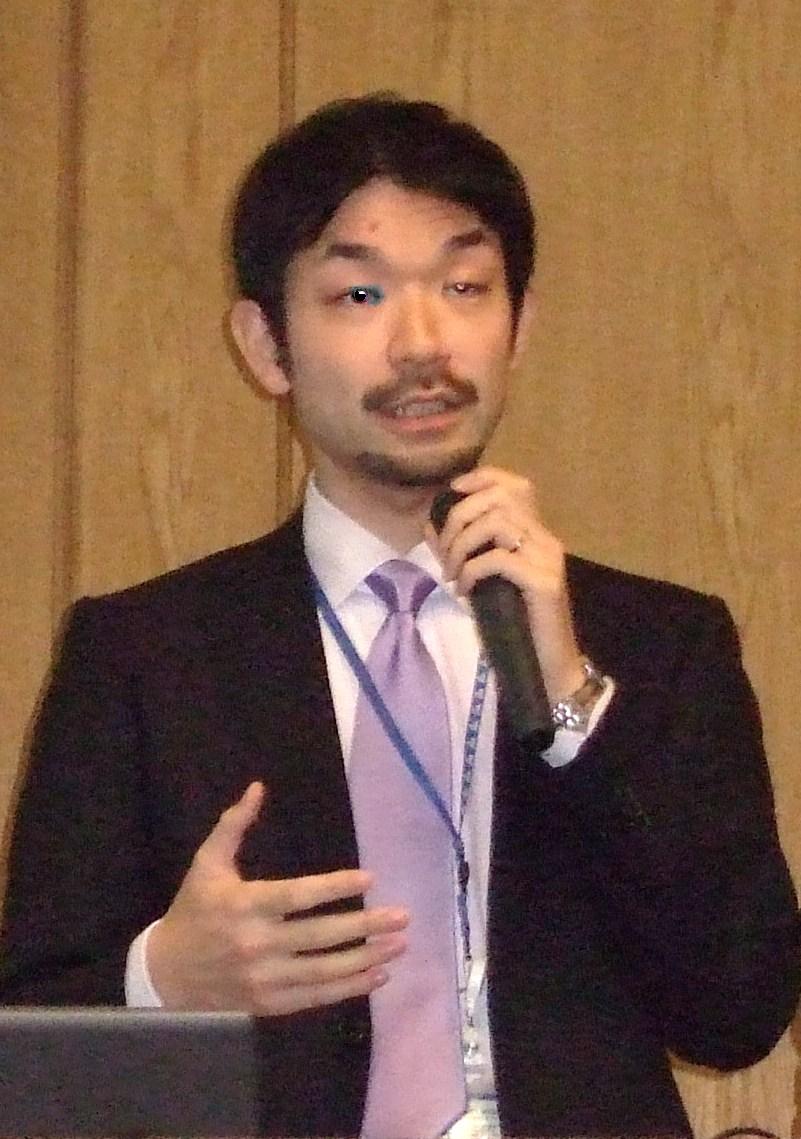US-Japan Joint Symposium on "Natural Resource Management for Peacebuilding and Statebuilding" Convened
2011.11.02
The US-Japan joint symposium on natural resource management for peacebuilding and statebuilding was held at JICA-RI in Tokyo on October 25. The symposium was co-hosted by the following five institutions: JICA-RI, the Environmental Law Institute (ELI) in the United States, the Global Infrastructure Fund Research Foundation Japan (GIF), the Graduate School of Frontier Sciences at the University of Tokyo, and the Research Center for Sustainable Peace of the Graduate School of Arts and Science at the University of Tokyo, and supported by the Japan Foundation Center for Global Partnership.

Takeuchi presenting cases of Rwanda and Burundi (left)
JICA-RI researchers presented findings from a newly launched research project, “Land and Property Problems in Post-conflict Statebuilding and Economic Development” while researchers from Japan, the US, Canada, and the Philippines shared results from a collaborative study "Harnessing Natural Resources for Peacebuilding: Lessons from U.S. and Japanese Assistance" by the ELI, GIF and the University of Tokyo. The speakers exchanged views with some 80 participants ranging from practitioners to researchers.
JICA-RI Senior Research Fellow Shinichi Takeuchi, the research leader of the above mentioned project, introduced the main concept of the study first. He explained that land and property problems often reflect political power structures, indicating the need for analysis and sensitivity over political aspects. “Inclusive policies that don't marginalize specific groups are essential in both political and economic fields," he said.
Takeuchi also discussed the findings from a comparative analysis of Rwanda and Burundi so far. The two countries share many characteristics from ethnic composition (Tutsi and Hutu), refugee issue caused by conflicts, and to land problems due to high population density and military clash. But, they have taken contrasting paths since the end of each conflict. While the minority Tutsi-led rebel won the war in Rwanda, an ethnic power-sharing approach was implemented in Burundi.
To settle land and property problems, Rwanda adopted a "land sharing policy" which grants half of the land owned by the Hutu original inhabitants to returning Tutsi refugees. Behind this “top-down” approach lies the political stability of the Rwandan government. By contrast, settlements of land disputes in Burundi were basically left to local community leaders. In a way, the power-sharing system is prevailing even at individual-level settlement of land tenure, making this “bottom-up” approach possible in the country.
"Rwanda has been successful in controlling people's dissatisfactions, at least for now," Takeuchi pointed out. "Yet, in Burundi, there is a heap of land problems left unresolved largely because reaching a settlement is difficult and takes time. Political power style affects land disputes and also the methods for their settlements."

Ryutaro Murotani
JICA-RI research associate Ryutaro Murotani joined Session 2: "Land and Property Problems in Post-conflict Sate-building and Economic Development" as a commentator. In his comment, he said that land and property problems are rather complex because of their intertwining relations with conflicts, and systems transplanted from outside could bring unexpected consequences. “Although donors often try to introduce modern 'land laws' to post-conflict countries, modern laws aren't necessarily the best solution for those situations. We should not look for ‘the best practice’ but for ‘the best fit,’” he stressed.
Another topic was the role of land/natural resource management in peacebuilding, and researchers presented case studies of seven countries and regions (Afghanistan, Liberia, Timor-Leste, Mindanao of the Philippines, Sri Lanka, South Sudan, and Cambodia). Many questions and comments were brought up from practitioners and researchers in the audience.
At the final panel discussion, panelists engaged in intense discussions while wrapping up key messages from the presentations. There Takeuchi shared his comment by referring to the two main approaches of post-conflict peacebuilding, which are 'from above' and 'from below.’ According to him, the peacebuilding from above focuses on peace agreements between warring parties, while the peacebuilding from below takes centers more on local efforts and rebuilding the livelihoods of the population, and “interventions in land and natural resource management can effectively contribute to peacebuilding from below as they are directly linked to people's daily lives,” Takeuchi stated. He also added, saying that “The peacebuilding process holds both top-down and bottom-up elements. So it’s important to consider political and policy issues at the state-level even when dealing with rehabilitation of people’s livelihood.”
Mr. Carl Bruch
Senior Attorney and Co-Director of International Programs, Environmental Law Institute, United States

事業事前評価表(地球規模課題対応国際科学技術協力(SATREPS)).国際協力機構 地球環境部 . 防災第一チーム. 1.案件名.国 名: フィリピン共和国.

事業事前評価表(地球規模課題対応国際科学技術協力(SATREPS)).国際協力機構 地球環境部 . 防災第一チーム. 1.案件名.国 名: フィリピン共和国.

事業事前評価表(地球規模課題対応国際科学技術協力(SATREPS)).国際協力機構 地球環境部 . 防災第一チーム. 1.案件名.国 名: フィリピン共和国.

事業事前評価表(地球規模課題対応国際科学技術協力(SATREPS)).国際協力機構 地球環境部 . 防災第一チーム. 1.案件名.国 名: フィリピン共和国.

事業事前評価表(地球規模課題対応国際科学技術協力(SATREPS)).国際協力機構 地球環境部 . 防災第一チーム. 1.案件名.国 名: フィリピン共和国.
scroll